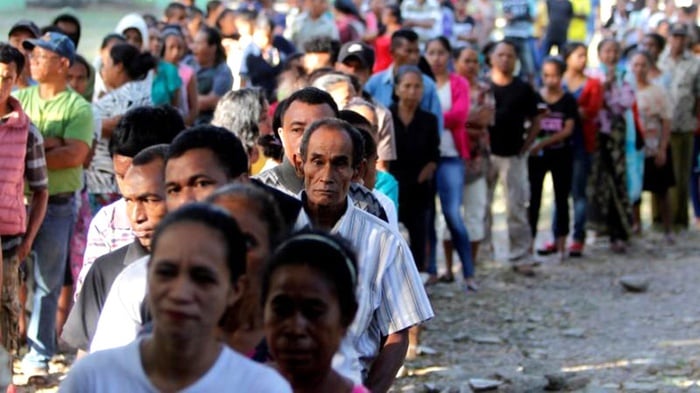 |
| Members of Grupu Agrikultura Manufahi (GAM) commercial seed producer harvesting Sele commercial seed (ACIAR) |
Businessmen and women are learning to grow and barter seeds from crops like corn, thanks to the help of an Australian Government aid program.
John Dalton is the Australian team leader for the Australian Centre for International Agricultural Research's (ACIAR) Seeds of Life program, which has been running since 2000.
For three or four months of each year many families experience the "hungry season" where, as John Dalton said, people literally do not have enough to eat.
"When ACIAR first went into Timor one of things they noted was that the varieties of seed crops were very old varieties and so it went about importing better varieties of rice, maize, sweet potato, cassava and peanuts," he said.
Prior to the intervention up to 40 per cent of stored maize was lost each year to pests, like weevils and rats.
But Mr Dalton said a simple change in varieties meant these losses were being eliminated.
"We have researched them right across the country in a range of situations," he said.
"Of the 12 released varieties they're averaging a 70 - 80 per cent lift in yield."
Survey results conducted by ACIAR show farmers are now starting to take the fortune of agriculture into their own hands.
"Our final phase, which ends in another 12 months, is to establish a seed system so that those varieties are available to the 130,000 East Timorese farmers."
Developing agricultural entrepreneurs
This year the Seeds of Life program is working to establish a sustainable national seed system.
"Seed supplies are grown and organised at a community level, through community seed producer groups," Mr Dalton said.
"They produce enough seed for themselves and store it for the next cropping and enough to distribute, barter or sell to their neighbours.
"There are three of these groups per village and 1300 across the country.
"We are working closely with the municipal staff of the Ministry of Agriculture to help them set up municipal seed systems so that each municipality knows how much seed it needs."
This program has been so successful that the country's reliance on imports of maize, corn and rice seed have almost ceased due to the creation of what Mr Dalton calls East Timor's first real agricultural entrepreneurs.
"We have now developed a commercial seed industry and about 60 producers now satisfy that demand" he said.
"The millions of dollars that used to go out of the country to Indonesia or Vietnam now stay in the country and those commercial seed producers are probably the first genuine entrepreneurs in agriculture.
"That is the way the country has to move."
Seeds of Life promotes social changes
What started out as a program to help farmers grow crops has resulted in large scale social change in many communities across the rugged terrain of East Timor.
Mr Dalton said East Timor needed to start making money from industries other than oil.
He said farmers were starting to take the economy in a different direction.
"There is a tendency for agriculture just to be seen as a subsistence lifestyle," Mr Dalton said.
"There is a huge need for the country to move forward on integrated rural development, so that it starts to generate wealth from something other than its oil resources.
"The name of the game is empowerment; to empower people to understand how they can continue to manage change.
"You have to hasten to slowly and there is a lot of mentoring and hand holding while people are training while largely on the job."
Seeds of Life is a program run within the Ministry of Agriculture in East Timor.
The program is funded collaboratively by the Australian and the Timor Leste governments.
The official aim is to establish a national seed system, including identifying improved varieties of maize, rice, sweet potato, peanut and cassava.
The seed system is currently in transition from being program led to being fully managed by the Ministry of Agriculture in East Timor and the Seeds of Life program will be closing in June of 2016.
It is understood Australian Aid and ACIAR are working on a follow-up project which would be aimed at more integrated rural development, so that village level activities could be coordinated.
Source: BBC.net.au
http://www.abc.net.au/news/2015-06-08/farmers-saving-the-economy-in-easttimor-through-seeds-of-life/6518046








